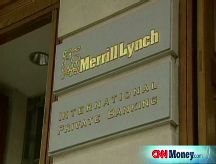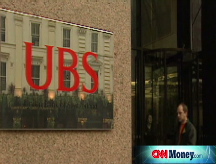Banks' settlements: Rare good deal for investors
NY strikes deal with Citigroup to buy back troubled securities from small investors and charities at 100% of their value. Merrill also offers clients their money back.
NEW YORK (CNNMoney.com) -- If your bank contacts you about a bond-like investment you made some time ago, don't ignore it. You could benefit from an unusual settlement that will allow you to get back 100% of your investment's value.
Citigroup announced Thursday that by Nov. 5 it would buy back so-called auction-rate securities from individual investors, charities and businesses with assets of $10 million or less. Hours later, Merrill Lynch (ML) announced it too would buy back retail investors' auction-rate securities at par. Some 30,000 retail customers hold a total of $12 billion of these securities.
"Our clients have been caught in an unprecedented liquidity crisis," said John Thain, Merril's chief executive officer. "We are solving it by giving them the option of selling their positions to us."
The Citi agreement settles a legal dispute with New York Attorney General Andrew Cuomo, and calls for the investment bank to repurchase at full value all securities of this type sold before Feb. 11. Citigroup (C, Fortune 500) will also reimburse all retail investors who sold their securities at a discount after the market for them shut down.
Some 40,000 Citi customers, whose holdings are worth more than $7 billion, are expected to benefit. Citigroup plans to shell out about $500 million to make the investors whole.
"The people are getting their money back," Cuomo said at a press conference.
Merrill, which acknowledged in a press release Cuomo's efforts to resolve the auction-rate securities problem, said its clients would have a year, beginning on Jan. 15, in which to sell their securities to the firm.
While Wall Street is no stranger to securities fraud settlements, these deals differ considerably from class-action lawsuits or restitution funds set up by state and federal officials, experts said.
Those agreements usually reimburse investors only part of what they lost - at times only 30 cents on the dollar. If shareholders retrieved 70% of their original holdings, it would be considered an ample award.
"This is a most unusual sort of settlement," said Alan Bromberg, securities law professor at Dedman School of Law, Southern Methodist University in Dallas, referring to the Citi deal. "This would be very generous. You could hardly ask for more."
It's likely superior to what the auction-rate securities holders would have received had they won a class-action suit, said John Coffee, securities law professor at Columbia Law School.
In this case, Citigroup and other investment banks ran into trouble when the auction-rate securities market froze this past winter amidst the credit crunch.
Until then, advisers had marketed the investments as a safe, liquid place to stash cash. What many investors didn't fully realize is that the value of their holdings - and their access to it - depended on buyers snapping up the securities at auction. When buyers abandoned the market in February, many investors were unable to draw on their holdings or were forced to sell them at a loss.
The agreement with Citigroup, one of the largest issuers of auction-rate securities, is expected to pave the way for settlements with other companies even beyond Merrill. Cuomo, whose threats last week to sue Citigroup brought them to the negotiating table, has also filed a multi-billion suit against UBS (UBS) for falsely marketing the investments as equivalent to cash at a time when the market for these securities was under severe strain. In June, Massachusetts state securities regulators filed a civil suit against the firm.
In a separate action Thursday, Morgan Stanley (MS, Fortune 500) agreed to reimburse two Massachusetts municipalities $1.5 million for their auction-rate securities. In the New York case, Citigroup also agreed to reimburse all refinancing fees to any New York state municipality which issued auction-rate securities since Aug. 1, 2007.
"It wouldn't surprise me to see a good number of similar cases," Bromberg said. ![]()




